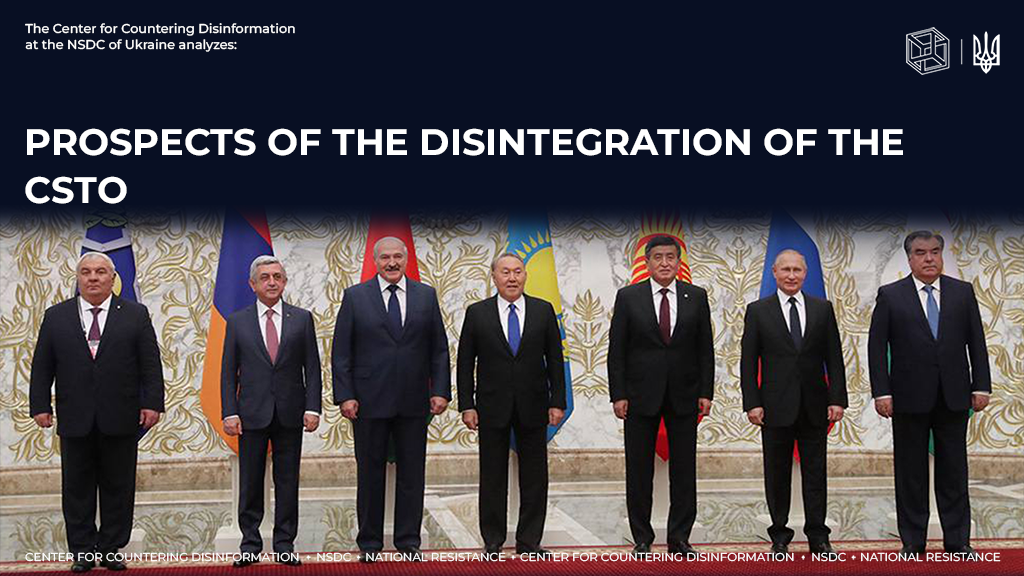❗ Against the background of russia’s catastrophic invasion of Ukraine, the bloc, which once promoted itself as a Eurasian answer to NATO, is going through one of its most difficult moments.
🔎 The Collective Security Treaty Organization (CSTO) is a military-political bloc (comprising russia, Armenia, Belarus, Kazakhstan, Kyrgyzstan, and Tajikistan), created on May 15, 1992 as a possible alternative to NATO. However, the formation of a full-fledged military association was hindered by the unresolved territorial disputes of its participants and russia’s desire to expand its spheres of influence, including through military means.
☝️ Many CSTO members are currently asking: what is the value of the military bloc for them and when and under what circumstances can moscow intervene in a military conflict within the organization? After all, less and less members of the organization believe in the ability of the CSTO forces to ensure a ceasefire.
🔸 Two of the CSTO members most dependent on russia – Kyrgyzstan and Armenia – no longer hide their irritation at the inactivity of the organization.
Distrust of the CSTO and putin himself intensified last month when Kyrgyz authorities indirectly accused the kremlin of orchestrating border clashes between Kyrgyzstan and Tajikistan in which about 100 people were killed. The fact that a day before his 70th birthday, Tajik President Emomali Rahmon received a prestigious award from putin “for ensuring regional stability and security” fueled Japarov’s conviction that the kremlin has a “favorite” in this conflict. And it is not surprising that the vice-prime minister of Kyrgyzstan Edil Baisalov said, explaining the cancellation of participation in the exercises, that society would not accept joint military exercises with Tajik troops on the territory of Kyrgyzstan.
Armenian Prime Minister Nikolay Pashinyan has the most reasons to be disappointed in the CSTO. During fierce clashes with Azerbaijan on September 13-14 and September 28, more than 200 servicemen were killed on both sides, and not only settlements in Nagorno-Karabakh, but also cities in Armenia itself were subjected to heavy artillery shelling. Yerevan invoked Article 4 of the bloc’s collective defense treaty, but pleas for help went unheeded. The CSTO limited itself to sending fact-check missions to the region, excluding the sending of the bloc’s troops. After a second series of clashes in late September, Pashinyan admitted that under pressure from an angry public, he might consider withdrawing Armenia from the alliance.
Uzbekistan, home to the largest standing army in Central Asia, joined the CSTO in 2005 but left again seven years later. Last week, Tashkent said it had no intention of renegotiating membership.
☝️ The war against Ukraine extremely complicated relations within the CSTO and dealt a significant blow to the bloc’s cohesion. Of the kremlin’s five military alliance partners, only Belarus openly supported russia’s unprovoked invasion of Ukraine. Uzbekistan, Kyrgyzstan and Tajikistan warned their citizens about their responsibility for participating in foreign conflicts and warned migrant workers in russia against going to the front in Ukraine.
And it is not surprising that putin’s trust rating in Central Asia has fallen significantly not only among the leaders, but also among the public. Judging by public opinion polls, four or five years ago in some Central Asian countries he was more popular than in russia (in Tajikistan his rating was about 92%). This was most vividly observed in Samarkand at the Shanghai Cooperation Organization (SCO) summit, where Central Asian leaders made putin wait for a meeting under the same scenario that putin himself had often played out in the past.
Kazakhstan, which participates in all multilateral organizations supported by russia, from the CSTO to the Eurasian Economic Union, has been demonstrating its independence from the russian federation for the past few months. For example, Kyrgyzstan’s resounding refusal to participate in the CSTO military exercises “Indestructible Brotherhood” was followed by the unexpected absence of the President of Kyrgyzstan Sadir Japarov at the meeting of the russian-led Commonwealth of Independent States (CIS) in st. petersburg, which took place on the 70th anniversary of president vladimir putin, when Japarov limited himself only to a telephone greeting.
❗ Thus, the CSTO military bloc, on the creation of which russia worked so diligently for the past two decades, is falling apart before our eyes, and the existence of the Eurasian Economic Union is in great question.
russia still has significant economic leverage over their participants, but this relationship has changed significantly.
☝️ Central Asian states now have much more leverage over russia than vice versa. They are beginning to realize their strength and ability to resist russia and no longer want russian troops to invade their territory.










